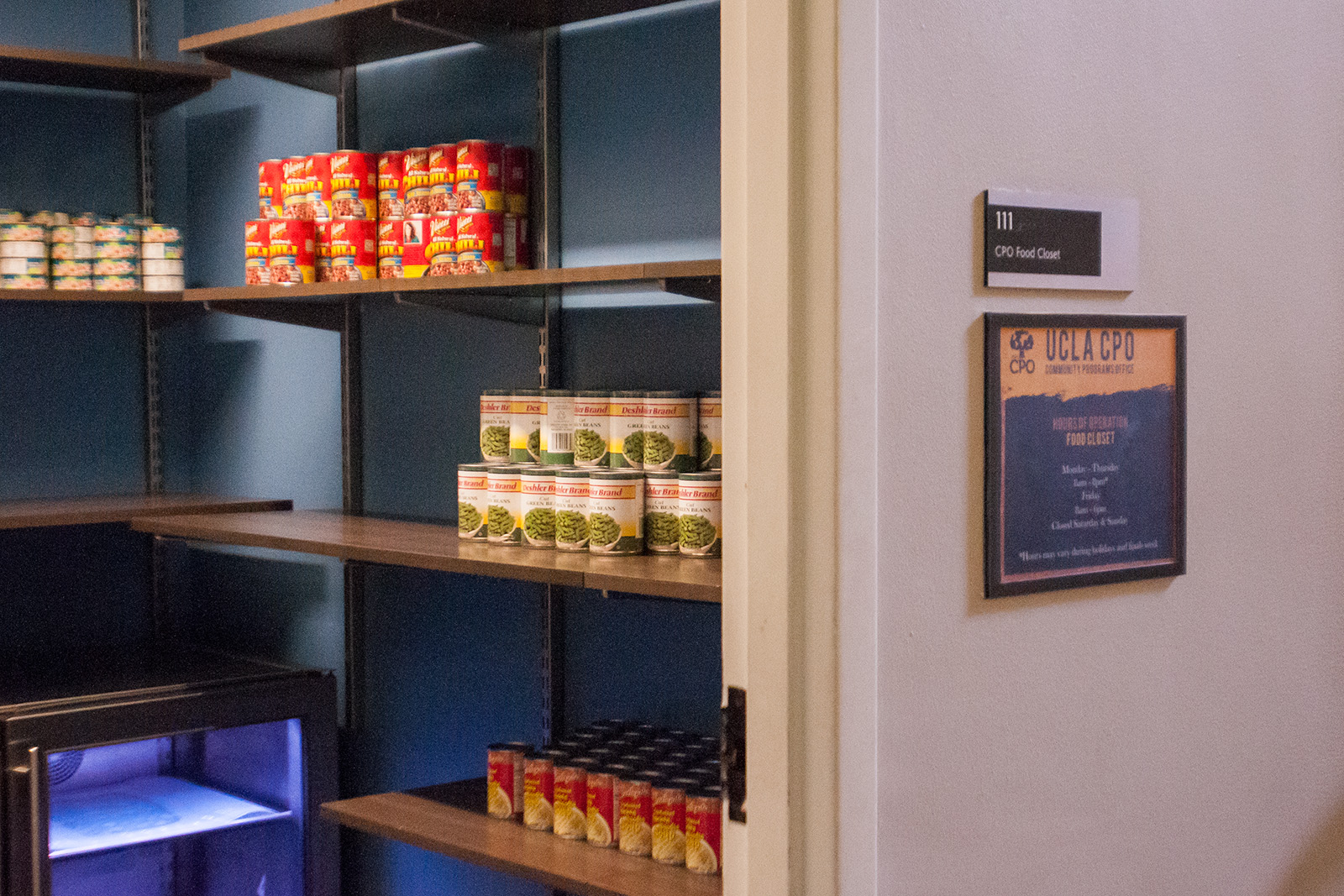Op-ed: Improving quality of food closet would better help students who need it

(Daily Bruin file photo)
By Evan Farrar
March 31, 2019 10:29 p.m.
Walking into the food closet in the Student Activities Center is an underwhelming experience at best.
They’re not kidding when they call it a closet.
Stacks of cans stock the walls of the tiny, cramped room, and that’s if you get there at the right time. You might be lucky enough to find some fresh fruit. Or else, you’re pretty much stuck with what’s left – maybe some canned tuna, or perhaps some tomato sauce. Just as a reminder, this is at the best public university in the nation.
Of course, that’s not to say that there’s a lack of diligent, devoted staff in the Community Programs Office working to provide for students’ basic needs. Proactive Bruins like Chidera Izuchukwu, CPO’s basic needs manager, commit much of their time to addressing the dire issue of food insecurity.
Yet, the problem is as pervasive as ever, and efforts on the part of UCLA administrators appear to be little more than superficial attempts to save face.
It is well-documented that students at UCLA and within the University of California system have high rates of food insecurity. According to the UC Global Food Initiative, a program spearheaded by the UC Office of the President, 44 percent of undergraduates and 26 percent of graduate students reported having experienced food insecurity in 2017. Not only are these students more likely to underperform academically relative to their food-secure peers, but they also experience heightened stress and mental health strain due to their insecurity.
Even more disturbing is how food insecurity disproportionately affects UCLA’s most disadvantaged populations. In the same report, the UC Global Food Initiative found that African-American, Latinx, American Indian and LGBTQ students are more likely to experience food insecurity.
Also, on average, food-insecure students are more pressed for time than their peers: Food-insecure students on average spend more time working and commuting. This means that it is even more difficult for these students to find the time necessary to access the full range of basic needs resources on campus.
When the food closet first opened in 2009, some UCLA students and their families were reeling from an economic recession. Some students were moving out of the dorms, couch surfing, using their financial aid to support their families and skipping meals to make sure they could afford books and supplies for school. In order to assist these particularly vulnerable students, the food closet began stocking nonperishable food items and networked with off-campus agencies to keep the closet full.
However, the food closet fails to adequately serve the UCLA students who need its services the most. For a start, it does not offer a wide variety of fresh, nutritious foods. Most of the food provided is canned or boxed and contains artificial preservatives associated with increased risk of diabetes, among other health issues. The reason for this is obvious: Perishable food items are typically more expensive, and their shelf time is limited. When staff can’t count on a steady supply, canned goods end up on most of the shelves.
But, for the good of the students, administrators must reach out to local organizations and businesses to find sources that can reliably supply nutritious food. It only helps that we have incredible role models to emulate, like UC Irvine, which offers a broad selection of fresh fruits, vegetables, and prepackaged foods in its spacious food pantry. UCLA’s food security infrastructure clearly pales in comparison to programs at other schools.
UCLA’s efforts are simply not meaningful enough. We can do better.
A lot is at stake. Food-insecure students face an insecurity that can touch every aspect of their lives and hinders them in numerous ways. Lower grades and less time to truly address their needs can negatively impact students’ mental health and self-worth.
If only these students actually had access to something nutritious and satisfying and didn’t need to worry about where to get their next meal – or whether it would be a can of sweet corn.
UCLA ought to devote adequate time and money to expanding its food closet by following in the footsteps of UC Irvine and other universities. Simply put, the food closet must be more than a closet – it must become a bastion of the university’s commitment to students’ health and well-being.
Farrar is a member of the Undergraduate Students Association Council’s General Representative 3 office and a first-year public affairs student.

